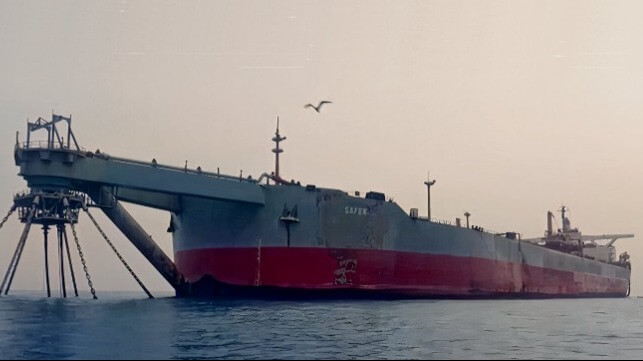UN Reaches 75% of FSO Safer Funding Goal with First Private Donation

The UN continues to report slow progress in its fund-raising efforts for the program to remove the oil stored on the FSO Safer which the organization has called “a ticking timebomb” off the coast of Yemen that threatens the entire Middle East. Announcing the receipt of the first donation from a private corporate donor, the UN has reached three-quarters of its initial $80 million goal.
Marking this critical point, the UN hopes the first pledge from a private sector organization will spur others to step up to help meet its urgent goal. At the same time, they are calling on the governments that make up the bulk of the current $62 million in pledged funds to disburse the monies to the UN. Reports indicate that they have only received $9 to $10 million of the funds.
After on-and-off negotiations with the Houthi rebels that control the area where the vessel is located, the UN reported in April that it had reached terms for the plan to address the Safer. The agreement calls for the UN to charter and position a temporary vessel alongside the Safer and undertake a ship-to-ship transfer of the estimated 1 million barrels of crude stored aboard the FSO. The Houthi claim the oil as their property demanding it and the Safer remain in Yemen until a permanent solution is provided.
The UN had previously been negotiating with the rebels to complete a survey of the FSO to develop a plan for repairs. Ultimately, the UN said although its inspectors were not permitted aboard the vessel that other surveys and reports from the skeleton crew aboard that determined the vessel was beyond repair. Built in 1976, it has been positioned off Yemen since 1988. Without the proper maintenance and the current state of the FSO, the UN says it fears the vessel could develop an uncontrollable leak, break apart, or explore since its tanks have not been properly vented in many years.
"HSA has closely followed the campaign led by the UN and the generous donations pledged by the international community. Given that there remains a large funding shortfall, and time is running out, HSA believes that the private sector must step forward,” said Nabil Hayel Saeed Anam, Managing Director, HSA Group – Yemen. The company, which is the largest private enterprise in the country, announced yesterday a donation of $1.2 million. "We hope that this first donation from the private sector may serve to encourage other companies across the world to contribute to the UN's response and avert this potentially catastrophic crisis."
The company joins governments, including the United States which pledged $10 million and Saudi Arabia which also promised up to $10 million, as part of the initial goal to raise the total of $80 million. With the HAS pledge, the UN says it is now just $16 million short of its goal.
Despite the UN’s prediction that a failure of the FSO Safer would cause a major oil spill larger than the Exxon Valdez and cost $20 billion in cleanup, they have faced an uphill battle to raise the funds. The Houthi have criticized the UN for moving slowly. In June, the UN hosted a fund-raising conference with the assistance of the Dutch, but it only netted a disappointing $33 million in commitments.

that matters most
Get the latest maritime news delivered to your inbox daily.
The UN has also sought to enlist the public in the efforts to secure the necessary funding. They launched a public crowdfunding campaign that raised just $142,000. A spokesperson however said they are planning to relaunch the campaign with a goal of reaching $5 million according to Reuters.
The estimated total cost for the project, which includes the permanent replacement FSO, is set at $144 million by the UN. They also hope to raise funds through the eventual sale of the FSO Safer to the breakers. The UN had originally said it hoped to complete the ship-to-ship transfer by this fall before the weather worsens in the area.
